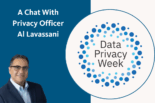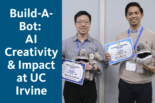Describe your role with CITRIS and the Banatao Institute?
I am fortunate to serve as executive director of CITRIS (Center for Information Technology Research in the Interest of Society), whose mission is to create information technology solutions for society’s most pressing problems. I also co-founded the CITRIS Policy Lab and the Women in Tech Initiative at UC. In my role as ED (together with the faculty director), I oversee the range of research and operations for the multi-campus research institute, one of four Institutes for Science and Innovation at UC. We are headquartered at UC Berkeley and work closely with partner campuses at Davis, Merced and Santa Cruz.
With Founding Director Brandie Nonnecke, I co-lead the CITRIS Policy Lab, which supports interdisciplinary technology policy research and engagement to better ensure development and deployment of technology in the interest of society. We work with public sector stakeholders, as well as academics and corporate leaders, to help guide policy decisions regarding artificial intelligence, privacy and data protection, social media and disinformation, and other topics. Within the Policy Lab, I also chair the California Blockchain Working Group, charged with advising the state legislature on implementation of blockchain technology in state government operations and providing guidance for California-based businesses regarding blockchain applications.
I co-lead the Women in Tech Initiative with Director Jill Finlayson and co-founder, Berkeley Engineering Dean Tsu-Jae King Liu. Working with academic and corporate leaders, we develop programs and facilitate research to highlight gender disparities in the tech field and propose solutions. For example, our annual symposium showcases leaders in tech, provides visibility for role models, and suggests opportunities for impact on tech issues. The theme of this year’s symposium is cybersecurity, a growing field where women comprise less than 20 percent of the workforce.
What is the nature of your current work on gender issues?
The Women in Tech Initiative at UC envisions a world in which women in technical fields are proportionately represented and equitably compensated throughout the professional ranks in industry, academia, and the public sector. We aim to increase the persistence and success of women in technical fields to achieve this vision.
As one of the top contributors of tech talent to Silicon Valley companies and startups, UC Berkeley and the UC campuses overall have an opportunity and obligation to equip all their graduates with the skills required for professional success and personal satisfaction. We offer public programs and workshops, and involve students in research projects related to issues regarding women in tech and diversity questions more broadly. Of course, many UC graduates have advanced through the professional ranks to positions of leadership themselves, and we collaborate with many of them to highlight recent research and best practices to create high-achieving and equitable workplaces.
What in your past do you think prepared you for an executive position?
Completing a PhD helped prepare me for academic leadership: I’ve been deeply immersed in the academic culture for more than two decades, both from the faculty perspective as well as in fundraising and administration. My degrees are in musicology (surprise!), and my training as a professional musician helped me to hone many leadership skills. As a collaborative performer (my favorite roles were as accompanist and chamber musician), I learned to listen carefully, create a shared understanding of the desired outcome, and hold myself and others accountable for the hard work that each individual must contribute to the whole. Musical performance offers opportunities to practice accepting feedback with grace and gratitude, a skill I admire in anyone who has risen to a leadership role.
My career path has been non-linear, having held positions in the humanities and social sciences before coming to engineering and technology. I have also worked in nonprofit organizations and government, as well as academia. This array of experiences has helped me relate to a variety of stakeholders, including students who might be questioning their own paths.
Prior to coming to CITRIS I was executive director of the Human Rights Center at Berkeley Law. I helped launch a program on technology and human rights, which has since flourished into an extraordinary research and education program. The issues the Human Rights Center worked on—families separated by conflict in Latin America, use of child soldiers in Congo, gender-based violence in East Africa—help me to keep the tribulations of leading a university-based research center in perspective!
What do you see as the key challenges faced by women in the IT fields?
Disparities regarding women’s participation in technical fields have been well documented in the business and tech literature. Among the social challenges are the prevalence of overtly or subtly hostile workplace cultures (recent firsthand accounts include Brotopia, Uncanny Valley, and Whistleblower), and research has shown the detrimental effects of stereotypes and implicit bias on women’s full participation in the workplace. Additional challenges include a lack of role models both in the media and in the public and private sectors; lack of representation in patenting; the gap in women as contributors or subjects in Wikipedia; and sexism in the open source software and online gaming communities. Compounding the inherent discrimination, women who speak up about these issues face rampant hostility on social media for exposing their views and experiences. These circumstances are demonstrably worse for women of color, reflected in the vanishingly small percentage of their participation in the IT workforce.
How can organizations address these challenges while ensuring fairness for everyone?
Addressing these challenges will increase fairness for everyone. Mobilizing for change can and should be driven from all parts of the organization, not just HR or executive offices. I’ll mention two broad areas of potential impact: culture and policy.
Culture: A durable solution will result only from the collaborative efforts of both men and women. Everyone in the organization should be encouraged to step up as allies and be recognized when they do. Organizational leaders must set the tone and be intentional about creating an inclusive workplace and culture. Twenty-first-century leadership skills include empathy, negotiation, and collaboration for everyone. Emerging leaders should be provided with training to foster psychological security in teams, seek and value diverse perspectives, and generate a sense of belonging for all employees. Metrics to address these attributes should be established, and progress toward these goals should be rewarded as part of the annual performance review. All of us must confront our own implicit biases—women and men make inaccurate assumptions and reinforce stereotypes, however unintentionally, whether writing recommendation letters, evaluating job candidates, conducting performance reviews or rating professors.
Policy: Eliminate non-disclosure agreements for sexual harassment. Although the use of these agreements has been controversial among women’s rights advocates, they more often protect the perpetrator than the victim; California has recently passed legislation to ban their use in cases of sexual harassment. Strengthen regulation to protect against discriminatory harms; for example, female startup founders report significant barriers to raising capital and outright harassment from VCs. Organizations like #MovingForward are leading efforts to encourage investment funds to adopt non-discrimination policies. Expand legislation to increase representation of women on corporate boards, such as that passed by California in 2018.
How not to handle discriminatory practices? Turn hiring and promotion decisions over to algorithms in the hope that they will yield less-biased results. Biased training data sets, flawed algorithms that lack transparency, and over-reliance on untested and unaudited “scores” could contribute to exacerbating bias rather than leveling the playing field for all.
What advice do you have for women aspiring to work or struggling to remain in the tech field?
Remain open to unexpected possibilities or pathways. Find mentors and allies throughout your network. Learn strategies for dealing with microaggressions and encourage others to become better allies. Use data to inform your salary negotiations and to champion policies and practices that will make the workplace better for everyone. More and more management positions will require a degree of technical fluency. Look beyond the tech sector itself. Many sectors and companies require leaders with advanced understanding of technical concepts without needing fluency in a particular coding language. Expand the frame of “tech” beyond coding. Technically intensive positions can encompass a range of skills: communications, design, governance, and more.







